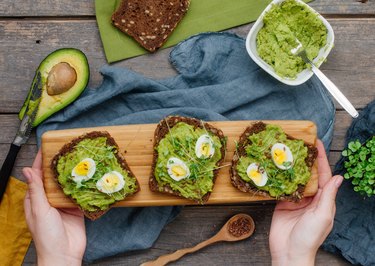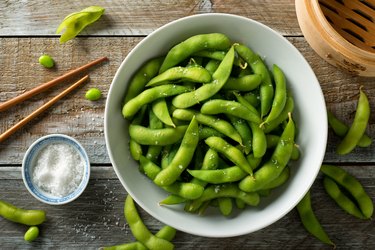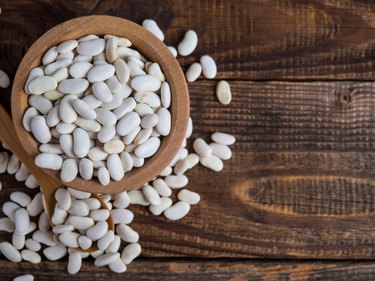Vitamin C (aka ascorbic acid) and the mineral zinc are known for their powerful antioxidant and immune-supporting benefits. You could pop a supplement to meet your daily zinc and vitamin C needs — or you can include a variety of delicious foods that happen to be good sources of both nutrients.
Vitamin C is an important antioxidant that aids in wound healing and also helps support the immune system, per the National Institutes of Health (NIH). It's especially important for people following a plant-based diet as it helps increase the absorption of non-heme iron (or iron from plants).
Video of the Day
Video of the Day
We need a daily supply of zinc to support our immune system, heal wounds and make protein and DNA, according to the NIH. Our bodies can't store the mineral, so eating foods high in zinc is important.
How Much Vitamin C and Zinc Do You Need?
Vitamin C: Adults assigned male at birth (AMAB) need 90 milligrams of C a day while adults assigned female at birth (AFAB) need 75 milligrams per day, per the NIH. People who smoke need 35 milligrams more than non-smokers.
Zinc: Adults AMAB need 11 milligrams per day while adults AFAB need 8 milligrams a day.
Foods high in zinc are mostly animal sources as well as beans and nuts whereas vitamin C-rich foods include fruits and vegetables. It can be tricky to find foods that are high in both vitamin C and zinc as many of the foods high in each come from different food groups.
The list below contains foods high in vitamin C and zinc, with one serving providing over 10 percent of the recommended Daily Value (DV) of each nutrient. The Food and Drug Administration (FDA) calculates its DV percentages based on 90 milligrams for vitamin C and 11 milligrams for zinc.
1. Avocados

Per one whole avocado:
- Vitamin C: 20.1 mg, 22% DV
- Zinc: 1.3 mg, 12% DV
Avocados are good for more than your Super Bowl guacamole. Avocado is one of the only fruits rich in vitamin C and zinc, providing 22 percent of the DV of C and 12 percent of the DV of zinc per a whole fruit.
Regularly eating avocado could also help keep your cholesterol levels down. Choosing unsaturated fats, like in avocado, over saturated fats may help reduce cholesterol, according to the Academy of Nutrition and Dietetics. Avocados are also high in fiber, with 13.5 grams in one whole fruit. A high-fiber diet may help lower cholesterol, blood pressure and inflammation, per the Mayo Clinic.
2. Peas
Per 1 cup cooked:
- Vitamin C: 58 mg, 64% DV
- Zinc: 1.8 mg, 16% DV
Peas wear a lot of different hats in the vegetable world. As a starchy veggie, they have more carbohydrates than most veg. One cup of peas provides 64 percent of the DV of vitamin C and 16 percent DV of zinc along with iron, magnesium, folate and several B vitamins.
Peas are a high-protein vegetable, with 8 grams per cup. Many vegan and vegetarian foods are fortified with pea protein, and pea protein powder is a great plant-based alternative to whey.
3. Cooked Spinach
Per 1 cup cooked:
- Vitamin C: 17.6 mg, 20% DV
- Zinc: 1.4 mg, 12% DV
Popeye was onto something with his constant supply of spinach. One cup of cooked spinach has 20 percent of the DV of vitamin C and 12 percent of the DV for zinc. It's also an excellent source of iron, magnesium, vitamin K and vitamin A.
If you have iron-deficiency anemia, spinach is the perfect food to add to your diet. Eating vitamin C-rich foods at the same time as high-iron foods can help improve your body's ability to absorb iron, explains the Mayo Clinic. Spinach has 36 percent DV of iron.
4. Edamame:

Per 1 cup boiled:
- Vitamin C: 9.5 mg, 11% DV
- Zinc: 2.1 mg, 19% DV
Edamame are soybeans that are harvested early before they harden into mature soybeans. These tender beans are a delicious plant-based protein that can be added to stir-fries, pasta dishes or salads. One cup of edamame has 19 percent DV of zinc and 11 percent of the DV for C.
The same size serving also gives you 121 percent DV of folate, a B vitamin needed to make DNA and other genetic material — it's especially important for people who are or could become pregnant, according to the NIH. That's because folate deficiencies could lead to neural tube defects or premature birth.
5. Kielbasa Sausage
Per 3 ounces:
- Vitamin C: 12.5 mg, 14% DV
- Zinc: 1.3 mg, 12% DV
Kielbasa sausage is a Polish sausage made from a mixture of beef and pork. While it naturally has zinc, vitamin C is added as a preservative. A 3-ounce serving of Kielbasa sausage has 14 percent DV of vitamin C and 12 percent of the DV for zinc.
While it is a good source of vitamin C and zinc, sausage also has a significant amount of saturated fat and sodium. Saturated fat should be limited to less than 10 percent of daily calories and sodium to less than 2,300 milligrams per day in a healthy diet, per the World Health Organization.
Foods Fortified With Vitamin C and Zinc
Many commercially produced fruit and vegetable juices, smoothies, cereals and bread have vitamin C and zinc added to them to help people meet their needs of these essential nutrients. Breakfast cereals are often fortified with both vitamin C and zinc, per the NIH.
6. Palm Hearts
Per 1 cup canned:
- Vitamin C: 11.5 mg, 13% DV
- Zinc: 1.7 mg, 15% DV
Palm hearts are a versatile ingredient often used as a meat or fish replacement in plant-based, vegetarian or vegan diets.
One cup of palm hearts has 13 percent of the DV for vitamin C and 15 percent DV for zinc. It's also low in calories, high in fiber and an excellent source of iron. While its meaty texture and mild flavor make it a tasty fish alternative, it's doesn't have the same amount of protein as fish. With only 3.7 grams per cup, you'll want to include another plant-based protein source in your meal.
7. Lima Beans

Per 1 cup cooked:
- Vitamin C: 17.2 mg, 19% DV
- Zinc: 1.6 mg, 14% DV
Lima beans, also known as butter beans, are a good source of vitamin C, zinc, protein and fiber. One cup of lima beans has 19 percent of the DV of vitamin C and 14 percent DV of zinc.
Foods High in Vitamin C and Zinc
Food | Vitamin C | Zinc |
|---|---|---|
Avocado | 22% DV | 12% DV |
Peas | 64% DV | 16% DV |
Cooked Spinach | 20% DV | 12% DV |
Edamame | 11% DV | 19% DV |
Kielbasa Sausage | 14% DV | 12% DV |
Palm Hearts | 13% DV | 15% DV |
Lima Beans | 19% DV | 14% DV |
- NIH: "Zinc"
- NIH: "Vitamin C"
- FDA:"Daily Value on the New Nutrition and Supplement Facts Labels"
- USDA: "My Food Data"
- Academy of Nutrition and Dietetics: "Choose Healthy Fats"
- Mayo Clinic: "Dietary Fiber:Essential For a Healthy Diet:
- Mayo Clinic: "Iron Deficiency Anemia"
- NIH: "Folate"
- World Health Organization: "Healthy Diet"
- Oregon State University Extension: "Should I Worry About the Cyanide in Lima Beans?"